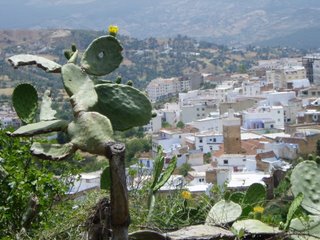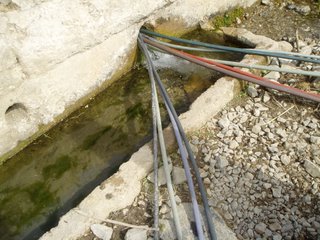I took a boat through the fist-clenching Strait of Gibraltar, walked across the border into Morocco, and took three separate taxis until I arrived in the mountain town of Chefchaouen.
This town was originally built as a stronghold against the invading Portuguese in 1472, and soon after, became the home of the Jews and Muslims fleeing the Spanish Inquisition. Christians were banned from the city until the 1920s, when the Spanish colonized the area. Those Christians that did enter the city risked the rather hefty penalty of death if caught therewithin.
The town is now most famous for its agricultural pursuits; which, much to the chagrin of the European Union, continue to be concentrated on the highly exportable crop of the finest grade of kif--a product manufactured with the Cannabis plant.
The place is beautiful--a collection of tightly packed houses and winding alleyways. Many of the houses have been painted a strange color--something between the most blinding and brilliant of whites and the lightest of blues--popularized by the Jewish population in the early 1900s. The huge Rif mountain range rises on nearly all sides, monopolozing the views and insulating interior life.

Unfortunately, the one group that no mountains have been able to keep out is the international tourist set, which is stopped by no geographical border or obstacle. As usual, this influx of tourists has spawned a burgeoning population of hustlers and dope dealers. One has a tough time walking even a minute without the need to turn down an offer for hash or kif. Offers are constant to visit the "family's artesanal factory" and responses to the negative are often met with icy stares, hurt looks, and occasionally, only slightly veiled threats. To be honest, the onslaught is so widespread that I don't see myself staying here long, even taking into consideration the beautiful natural surroundings.

Yesterday, after walking around a bit and eating a delcious tagine de kefta, I headed up into the hills, wishing to see the town from above and explore a crumbling mosque visible from the city center. The mosque was built by the Spanish and effectively boycotted by the Moroccans, and while it has settled into a comfortable disrepair, it is still painted by the municipality, and boasts a pristine white-blue color.
As I sat atop the hill, struggling in my dehydration and exhaustion, I began to talk with a young Moroccan guy, Ali, and an older American couple, Carole and Wilfred. We spoke of the local history and third world-first world relations, and eventually we three Americans decided to take up Ali on his offer to tour the fields of the Rif's most important crop--kif.
It is quite strange the way things work here in regard to the kif plantations. There is none of the Leo DiCaprio 'Beach' sort of secrecy about the work that goes on these hills. On the contrary, everything seems quite institutional, and taking a tour of the crop feels not unlike a winery tour in which one sees the plants, learns of the process involved in production, and is encouraged to try the local vintage.
As Ali explained to us, the plantations that we visited exist somewhere in the middle range on the scale of legal trouble. The big dealers, those that deliver to Europe and beyond, are very friendly with the police, and suffer little at the hands of local authorities. Very rural growers are likewise quite safe, as their isolation protects them. Small towns like the one we visited are generally okay, and their work is a very, very open secret. Those most at risk are small-time dealers and growers in highly populated regions. And so turns the world, as the fat cats build fortified mansions and the little man goes to jail.
So through the fields of waving green I walked with my new companions and our guide. I could hardly have asked for better company, as Ali was both knowledgable and friendly, and Carole and Wilfred were the most adventurous, open-minded, and vital couple in their mid-sixties that I have ever had the pleasure to meet.

I was amazed at how professional the entire operation is. A recent windstorm had ruined much of the crop, but what remained was well-tended and cared for. People roamed the fields, weeding and discarding male plants. Hoses and irrigation systems coursed through the land and homemade sprinklers [pierced garden hoses] spread the water. In addition to kif, I saw the fields of wheat with which local bread is made, potatoes, onions, and grazing animals.

What is so so sad and so interesting about this whole industry is the way in which international politics and locals laws affect the whole thing. For the local people kif is a normal part of life, not merely some sort of Bob Marley-loving, European thing. Kif is enjoyed by shopkeepers and shepards, men of all ages and professions. They smoke out of long, thin pipes, or spread potent hash oil on their cigarettes. This is part of their daily life, and has been for hundreds of years.
Big dealers and small hustlers are arguably only responding to a Western demand when they grow entire fields of the crop. They are then vilified, imprisoned and harassed at the behest of Western governments. It is, to be sure, a strange (and yet extremely common] state of affairs, and it doesn't seem crazy to think that a change in the laws or habits of the Western World would have a very positive effect on the situation here.
Tomorrow I head off for somewhere different, perhaps directly to Fez, where I hope to enroll in an Arabic class at a local institute. Until then, I bid you adieu, adios, and goodbye.

No comments:
Post a Comment